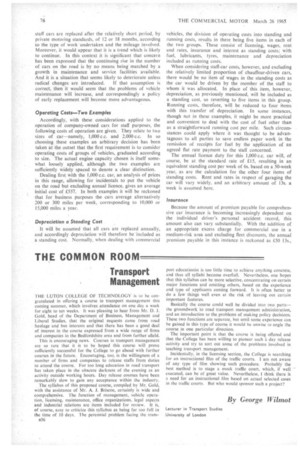THE COMMON ROOM Transport Management
Page 78

If you've noticed an error in this article please click here to report it so we can fix it.
THE LUTON COLLEGE OF TECHNOLOGY is to be congratulated in offering a course in transport management this coming summer, which involves attendance on one day a week for eight to ten weeks. It was pleasing to hear from Mr. D. J. Gold, head of the Department of Business, Management and Liberal Studies, that the original requests came from road haulage and bus interests and that there has been a good deal of interest in the course expressed from a wide range of firms and companies in the Bedfordshire area and from farther afield.
This is encouraging news. Courses in transport management are so rare that it is to be hoped this course will prove sufficiently successful for the College to go ahead with further courses in the future. Encouraging, too, is the willingness of a number of firms and companies to release staffs from duties to attend the course. For too long education in road transport has taken place in the obscure darkness of the evening as an activity outside working hours. Day release courses have been remarkably slow to gain any acceptance within the industry.
• The syllabus of this proposed course, compiled by Mr. Gold, with the assistance of Mr. A. J. Briscoe, certainly is wide and comprehensive. The function of management, vehicle operation, licensing, maintenance, office organizations, legal aspects and industrial relations are items included for review. It is, of course, easy to criticize this syllabus as being far too full in the time of 10 days. The perennial problem facing the trans
n36
port educationist is too little time to achieve anything concrete, and thus all syllabi become overfull. Nevertheless, one hopes that this syllabus can be more selective, concentrating on certain major functions and omitting others, based on the experience and type of applicants coming forward. It is often better to do a few things well even at the risk of leaving out certain important features.
Basically the course could well be divided into two parts— the groundwork to road transport management administration, and an introduction to the problems of making policy decisions. These two functions are separate, but until some experience can be gained in this type of course it would he unwise to angle the course in one particular direction.
The important point is that the course is being offered and• that the College has been willing to pioneer such a day release activity and try to sort out some of the problems involved in teaching transport management.
Incidentally, in the licensing section, the College is searching for an instructional film of the traffic courts. I am not aware of any type of film showing such procedure. Probably the best method is to stage a mock traffic court, which, if well executed, can be of great value. Nevertheless, I think there is a need for an instructional filin based on actual selected cases in the traffic courts. But who would sponsor such a project?




























































































































